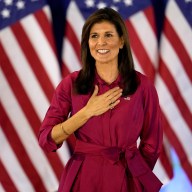Having landed safely on Canadian soil, George Galloway, the controversial former British MP, is threatening to sue Citizenship and Immigration Minister Jason Kenney for “denying” him entry to Canada last spring when Galloway was planning to speak here about Middle East conflict and the war on terrorism.
If Galloway makes good on this threat, he will have some major hurdles to overcome.
Firstly, in the highly anticipated decision released last week by Canada’s Federal Court, Mr. Justice Mosley took great pains to make the point that Galloway was not, in fact, “barred from Canada” by Kenney.
Instead, through his officials, our immigration minister let it be known to Galloway that a preliminary assessment of his anticipated entry to Canada suggested that he was inadmissible to Canada for having given financial support to Hamas, a terrorist organization. Galloway was invited to make submissions to address the minister’s concerns.
Of course, every foreign national seeking to enter Canada carries the burden of proving that none of Canada’s grounds of inadmissibility apply to them. Galloway chose not to make such submissions either to the minister or at a port-of-entry. Instead, he cancelled his trip.
As Mosley ruled “…no final decision was made regarding his admissibility. There is, therefore, no decision to review.”
In the ordinary course, travellers are confronted for the very first time about an admissibility issue right at the border. Accordingly, it would appear that Galloway will somehow have to re-frame Kenney’s request for information into a politically motivated “ban” which I have great doubt he will be able to do.
Secondly, if Galloway pursues a lawsuit he will no doubt wish to allege again that the minister’s actions resulted from his opposition to Galloway’s political views.
Galloway has been successful in persuading some Canadians that this affair is not about national security or our anti-terrorism laws but is, instead, all about Kenney’s attempt to curtail freedom of speech in Canada. Kenney’s lawyers argued in court that Galloway’s political beliefs are “irrelevant because his admissibility was legitimately evaluated on the basis of his own actions and in accordance with relevant legislation.”
Galloway will undoubtedly face a challenge in suing Kenney because if there is no “decision” there can hardly be a “politically-motivated” one.
Thirdly, Galloway will have to overcome the fact Kenney has been able to show he acted reasonably since the court certified that the actions taken by him and his officials raise legal questions of general importance relating to matters of national security.
In the proceedings, Galloway did not challenge the fact Hamas was a terrorist organization, and that it was properly listed as a terrorist entity under Canada’s Criminal Code. Although he denied being a supporter or member of Hamas, it was found that he delivered cash donations directly to the head of the Hamas government in Gaza in a highly publicized gesture. Although these particular funds were used for charitable and humanitarian purposes, the court noted that “aid provided for an innocent purpose frees up resources that can be employed to carry out a terrorist attack.”
Without more, is this enough to deny someone admission to Canada?
Mosley noted that in the United States it is easier to ban someone for being a supporter of a terrorist organization. In the U.S. “it is sufficient to establish that the person knowingly made a contribution to a group which has been designated a ‘foreign terrorist organization’ whether or not it was for a terrorist purpose.”
In Canada, it is more difficult to ban someone. Here it is not enough to prove the contribution. It must also be proven that the donor’s purpose “is to enhance the ability of a terrorist group to facilitate or carry out a terrorist activity.” That can be hard to do.
As an aside, it is interesting to note that given the state of U.S. law, Galloway has entered the United States at least three times without apparently being confronted with the enforcement of these provisions.
When the Federal Court dismisses a judicial review of an immigration decision, it is usually the end of the line for the applicant unless the Court certifies that the applicant has raised an important question of law that should be reviewed by the Federal Court of Appeal. In this case the court found the facts did raise an important question, not about freedom of speech, but whether under Canadian law a voluntary contribution of cash to a terrorist organization listed in our criminal code without other acts or indicia of membership, constitute reasonable grounds to believe that the donor has engaged in terrorist acts or is a member of a terrorist organization so as to make the donor inadmissible to Canada on security grounds.
The very fact the court certified this question establishes that Kenney, whether he was politically motivated or not, was wrestling with a legitimate legal question concerning Canada’s national security interests when he invited Galloway to provide feedback to his preliminary concerns.
This weekend, Galloway was photographed donning maple leaf mitts in a mock boxing pose challenging Kenney to a five-round debate. I’m not sure who would win such a debate. But in court, I think Kenney will have the upper hand should Galloway decide to sue.
Guidy Mamann practices law in Toronto at Mamann, Sandaluk and is
certified by the Law Society of Upper Canada as an immigration
specialist. For more information, visit www.migrationlaw.com or email metro@migrationlaw.com
















